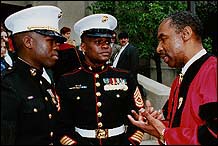![]()
Departments
![]()

|
5 June 1998 |
Vol. I, No. 32 |
Feature Article
Guide to graduates
A preacher points to the Promised Land
by Marion Sawey
Former U.S. Rep. Rev. Dr. Floyd H. Flake returned on Commencement Day to Marsh Chapel, where he had once been dean, to deliver a Baccalaureate sermon that called on students to prove their greatness. Flake was director of the University's Martin Luther King, Jr., Center as well as Marsh Chapel dean from 1973 to 1976.
Now pastor of the Allen African Methodist Episcopal Church in Queens, N.Y., Flake based his sermon on a passage from Joshua, read by President Jon Westling. In the reading, Joshua challenged the children of the tribe of Joseph to prove their greatness by going up to "the wood country" -- the portion of land allotted to them -- and making it their own by driving out the Canaanites. However, the tribe complained to Joshua that they deserved more land because history had shown that they were a great people.
"The lesson presents a story of a people who by their own definition were great, but a people who did not see themselves as having the capability of becoming greater," said Flake. The tribe did not understand, he pointed out, that greatness is not only defined by the accomplishments of past generations, but must mark the accomplishments of those who make history in the present.
|
|
|
Baccalaureate
speaker Floyd H. Flake converses with Lt.
Christopher Shaw (left) and Gunnery Sgt. Charles
Bush outside Marsh Chapel. Photo by Kalman Zabarsky
|
Outlining social problems that he claimed need "immediate attention," Flake said that America has to fulfill its constitutional obligation of assuring that every citizen has an equal opportunity to succeed, regardless of race, creed, gender, or color. "Affirmative action, as we know it, is on the respirator," he acknowleged. "But regardless of the outcome, when the plug is pulled, there must still be a commitment for the providing of equal opportunities."
Flake also stressed that the educational gap between students in urban and suburban communities has to be addressed by any means necessary. "The allocation of resources and the development of opportunities for choice -- whether more magnet schools, charter schools, or the more radical approach of government-funded vouchers -- must be explored to the fullest so that this great nation can rise beyond the lower tier in its competition with other developed nations around the world."
Turning to the economic disparity between rich and poor, Flake called for the creation of greater possibilities of homeownership for every American. Homeowners, he said, develop a greater sense of self-worth, while homeownership helps narrow the economic gap by creating equity that can be used for entrepreneurship or other important purposes, such as paying college tuition.
He also highlighted the importance of fostering the economic development of poor urban communities. "This must be done through public and private partnerships that utilize the human resource capital in the communities, through government dollars, and through the talent, ingenuity, creativity, and finance of the business community and the philanthropic grants of the altruistic community," he said. "It is essential that these urban centers, which are still the windows of America, are rebuilt so that the democracy which we export is not viewed as hypocrisy at home."
These challenges, he told worshipers, are like the challenge of "the wood country," a place filled with opportunities but that had to be cultivated and developed. "The work will not be easy," he warned. "The giants that are represented by our phobias and fears, our presumptions and assumptions, our limitations and exaggerations, must be placed within the context of a vision that makes us believe that our greatness is determined by our will to achieve.
"So as you go into the world proclaiming your greatness, don't be afraid to find the wood country and demonstrate your greatness by proving it through your labor of love, not just for yourself, but for others who occupy this planet and this nation with you."
The sermon was received with sustained applause by a congregation that filled Marsh Chapel to overflowing.
The Baccalaureate service was led by Marsh Chapel Dean Robert Watts Thornburg, joined by BU's Roman Catholic chaplain, the Rev. Chuck Cunniff, President Westling, and Chancellor John Silber. Music was provided by the Baccalaureate Choir, directed by STH Assistant Professor and University Organist Julian Wachner, and the Atlantic Brass Quintet, the ensemble-in-residence at the School for the Arts.
Flake became pastor in 1976 at the Allen African Methodist Episcopal Church. In 1986 he was elected as a representative from New York's Sixth District to Congress, where he served as senior member of the House Committee on Banking and Financial Services and the Committee on Small Business. In November 1997 Flake resigned from Congress to concentrate on the Allen African Methodist Episcopal Church.
